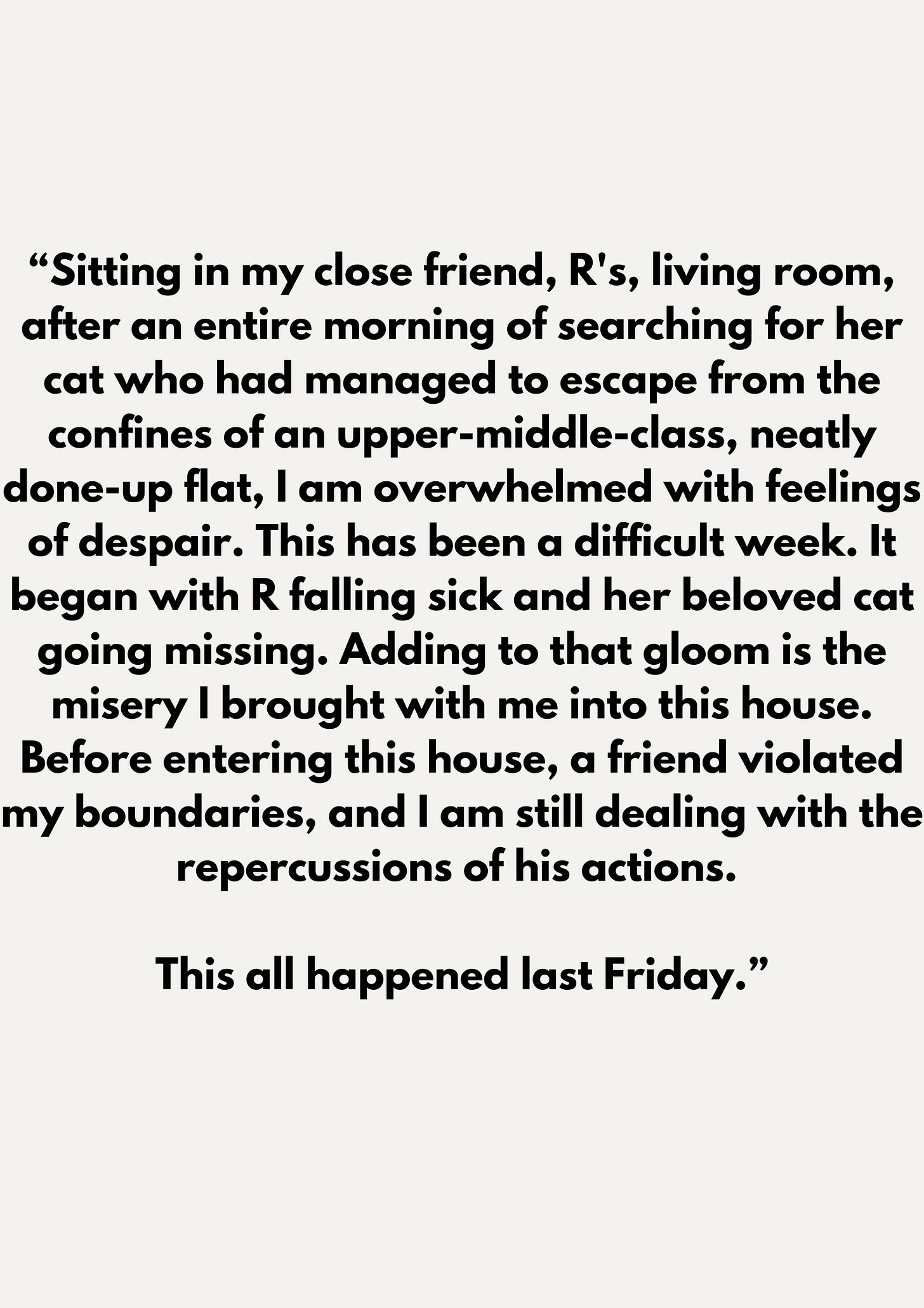The first decade of my life on planet Earth was spent dealing with sexual violence. If you know me, you know about it. I wrote a whole book detailing the events of the past. The problem with trauma, though, is that the past is never in the past. Its towering shadow is always looming large, making its presence known.
It is omnipresent, all-encompassing, all-consuming, and unending. You learn to live with it, trick it into vacating your mind for a while, and it works. There are brilliant days when you don’t even think of it. Then it comes back. My collection of traumas came back when I read the Vulture reportage on Neil Gaiman and all the women he ‘allegedly’ raped.
But while what happened in my childhood still haunts me, I don’t want to talk about it today. What I want to talk about is something that happened last year, something that I am still unsure about.
Let the trauma games begin
Let me say this out loud before I begin to talk about the night it all happened. The friend in question, let’s call him A, was drunk. His inhibitions were low. And perhaps, despite the events that unfolded, none of it was intentional. This isn’t a disclaimer, nor an exoneration of my former friend from his responsibilities. But it is to present the confusion I carry in my body about his actions and the lack of acknowledgement and accountability.
Stage One: Shock
It began with a tight hug. A form of comfort, a return to our decade-old friendship. I was introduced to a few other writers I didn’t know and I found them to be warm, intelligent, and wonderful. This is how the night began. I was offered drinks to which I said no. But A progressively got drunk. He would slur when talking. He would often be unstable on his feet. Because we were connecting after years there was a lot to talk about.
Through the course of the four hours I spent in that company, my friend touched me a lot. He gave me several hugs, planted several kisses on my cheeks, squeezed my stomach to the point of pain, tried to cuddle with me (I think), touched my face, pulled my cheeks, fiddled with my nose pin, tried to give me a foot massage, and tried to lift me in his arms. It was at this point that a person who was in our group intervened. And A was forced to pull away. This was followed by an attempt at waltz dancing to a song I can’t seem to remember. And after that, I decided to leave.
I reached my room, I wanted to take a bath again but was too tired. I was lying in bed, thinking about what had just happened and why I was feeling uncomfortable. I texted a close friend, N, telling her about it because I was being nagged by a feeling I had no language for at the moment. When I told her about this weird touchy-feely encounter, she called it disgusting. But we laughed about how “men are disgusting”.
And then sudden vomit rose into my throat. I tried to push it down and keep talking to N. But it wouldn’t stay. I emptied my stomach and brushed my teeth. And I finally could fall asleep. The next morning, I was supposed to read my poems in front of an audience, which I did after taking two anti-anxiety meds. I forgot to introduce myself, engage with people, and sign copies of my book they might have bought.
I wanted to vanish.
Stage Two: Denial
I was reminded of this incident, repeatedly, while reading the Vulture piece on Gaiman. Not because what Gaiman did to those women happened to me. It didn’t. I wasn’t raped, nothing even close to the horrors the women witnessed happened to me that night. But there were parallels.
These women who suffered under the hands of Gaiman were of no consequence to him. They were objects. Could just have been sex toys he jerked on without caring for their consent. I too felt like an object whose stomach could be squeezed, whose body could be grabbed. There is a deep sense of nothingness that I imagine those women felt, I felt that nothingness too. A very specific kind of invisibility that sexual assault survivors have repeatedly experienced.
The next morning, when I woke up I had read a few poems from my poetry collection Origami Aai. I made some coffee, got dressed, and went to the venue. The first thing I did after reaching the venue was to look for people I knew so I would have someone to hang out with. I found a few but they were just acquaintances. So I texted A asking for his whereabouts. He responded to the text sharing his location, I walked to him, and we hung out again.
It was almost like the vomit had removed memories of the night before.
After my reading, I attended a few more sessions, had lunch alone, and retired to my room for a nap. In the evening, I thought I should step out and mingle, a thing I am not very good at. But A is. So, I texted him again, he again told me where he was. And, so, we once again were together.
I want to be transparent. For the two days I spent at the event, I texted A a few times, from asking him about his location to even checking up on him. He was travelling with gifts for a bunch of people, and I loved what he had brought for me. Just that I forgot to pick it up. And so, before we left the place that contained within its walls the night of horrors, I asked him about my gift. He informed me that he had packed it, and I should visit him some time to get it. We laughed about it. And parted ways.
The city where all of this was happening is one where several of my friends live. My next few days would be spent travelling from one corner of the city to another. I was on the road a lot and therefore was alone with my thoughts constantly, with the city noise being the only distraction. One such evening, travelling from one end of the city to another, I called D. And started crying involuntarily. It was finally dawning on me, the impact of what my body had experienced that night. D looked at my tears-soaked face in horror and offered me a vocabulary for what had happened.
My body, they said, was violated.

Stage Three: Rage
I carried this knowledge with me to R’s place, which was going to be my home for the next week. The following week, I would be surrounded by the love of humans and animals. I would be cuddling with an eager dog and a reluctant cat, and their people, who heard my story, would offer me the kind of necessary anger my mind and body have a troubling relationship with.
Anger, my therapist keeps reminding me, plays a key role in our emotional life. Without anger, we deny ourselves a protective mechanism. We don’t allow ourselves to react to a life event fully without actually permitting our body to experience impact. Anger tells you that you were wronged. It kicks in a response that is necessary to protect yourself. But for me, anger doesn’t come easily. I dissociate, I run away from anger, I rationalise it, I suppress it to the point that I simply cannot feel it.
This is one of the many symptoms of a trauma-informed life. I learnt to overlook my anger to protect myself from my abusers as a child. It became a natural state of being.
In my time spent in a quiet room of that house, I cried a lot. I reached out to a lot of friends. I visited a college to deliver a talk about my first book and talk about mental health. And I wrote the essay I have shared a few lines from above. The week was marred by several panic attacks, severe heart palpitations, and the viewing of a disturbing film (Long Legs), with a special accompaniment of a ton of great food.
By the end of my trip, my community of friends had come together to hold space for my anger and my fears till I was ready to deal with it fully. I was finally, reluctantly, feeling angry. Angry at myself for freezing and later fleeing instead of saying ‘NO’. Angry that it was so easy to breach lines of trust with me. Angry that the one who violated me was a friend who knew me, who should have known me. Angry that this violation had become a theme of life.
Angry that it happened and that I have to defend myself and my experience not only to others, but even to myself. I couldn’t stop myself from experiencing this confusion around the night. Was I overreacting? I kept asking myself. He did not intend to violate or harass me. I said to myself and to anyone willing to listen.
Does intention matter, they asked me in return.
Stage Four: Depression
This wasn’t an ‘accident’. If you didn’t intend to kill someone, but still did, a life is gone forever. It doesn’t matter if your goal was not to kill them.
It took me months to settle on an answer to their question: Intention does not matter. My experience does.
So, when I flew back to Mumbai and began holing myself in my room trying to drown in work, there was a constant feeling of unrest. I was getting panic attacks, I was finding it hard to swallow or keep down food. I was making mistakes at work, I was forgetting things I had to do, I was getting lost in the labyrinth of my mind, struggling to find a way out. My psychiatrist suggested increasing my SSRI dose. But my therapist suggested trying something new. Confronting the man who had triggered this unfortunate series of events.
I decided I had to do something about the night. I had to stand up for myself, and for the childhood Manjiri who I had repeatedly let down. And therefore I confronted my friend. I let him know how he had made me feel and how that wasn’t okay. He sent a quick response.
“I am really sorry,” he said.
But I didn’t think it was enough. I needed more reflection. I needed accountability. I needed him to course correct, and stop the alcohol abuse and get his act together. And to make these things known, I wrote him a long email.
In hindsight, this was a mistake. You see, in my haze of depression, confusion, and anger all playing on my mind at once, I marked a few friends on that email, making it a public-private conversation. I forgot that it was anyway not my place to ask him to turn his life around. And that alcohol abuse is not an excuse to violate anyone.
He wrote back with an angry email where he listed out how, if I had been so violated, was it that I was constantly texting him, hanging out with him, cracking jokes with him, and even asking for my present. How was it that I had not said no or pulled away even once? A list of all my past transgressions was drawn to prove that I wasn’t the innocent woman I was portraying myself to be.
Something that Neil Gaiman and his lawyers are not doing to all the women who have come out in the open to speak against him.
End Of An Era
Reading that email wasn’t easy. It took me several days to read it in its entirety. I spent days blaming myself for everything he had pointed out. It took several voices—my friends’ and my brother’s—to help me understand that I didn’t need to be the perfect victim. All I needed was to trust myself.
The incident cost me a few friends, I will someday write about that. Perhaps in my next post. As it happens in any dispute, people choose sides. In the recent Justin Baldoni and Blake Lively case, there already are Camp Baldoni and Camp Lively. In my case too, some friendships fell apart. People had their opinions and views and I wasn’t open to them. And of course, my life wasn’t half as interesting as that of celebrities, so people soon moved on from it.
But I didn’t.
I spent several weeks debating in my mind if I needed to beg these friends to come back. Then choosing against it and imagining my life without these presences. Funnily enough, after the few weeks that were spent in an anxiety-ridden fever dream, I came out on the other side saner. I felt like life wasn’t impossible without those friendships.
The walk towards the light at the end of the tunnel had taken me to a fully lit corridor. Some of those friends returned, others may never. A and I are never going to be friends again. I still keep thinking it wasn’t his intention. But there is a voice in my mind that reminds me it doesn’t matter. I still experienced what I experienced.
Writing this post is an attempt to leave behind my anxieties, fears, and the gnawing worry that ebbs at me every day that I don’t empty my heart out. By writing this out and sending it out to the world, I am parking all this undesired misery in the void that is the internet. May it give strength to those who need it.
But most importantly, I am vacating my body, my mind, and my heart, so it has room for other feelings, and experiences, most of which, I hope, will bring me joy and help me move past the night that marked the beginning of an end.
Note: If you know me, if you think I am a close acquaintance or a friend, but if you don’t know who this person is, don’t message me. I am not disclosing any names.






